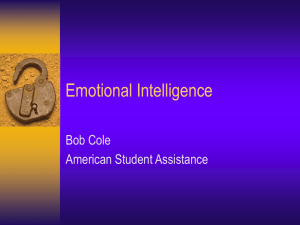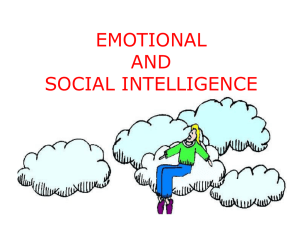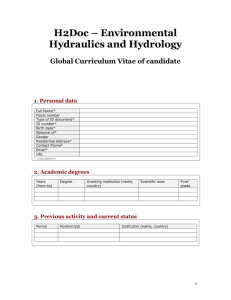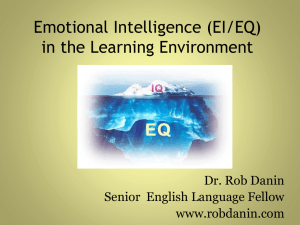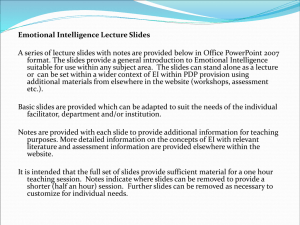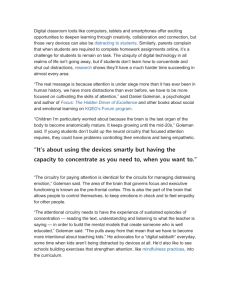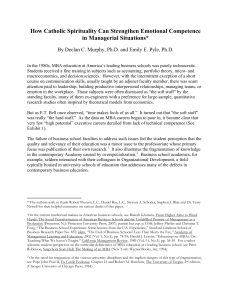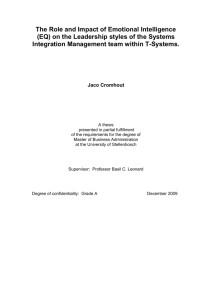Enclosure
advertisement
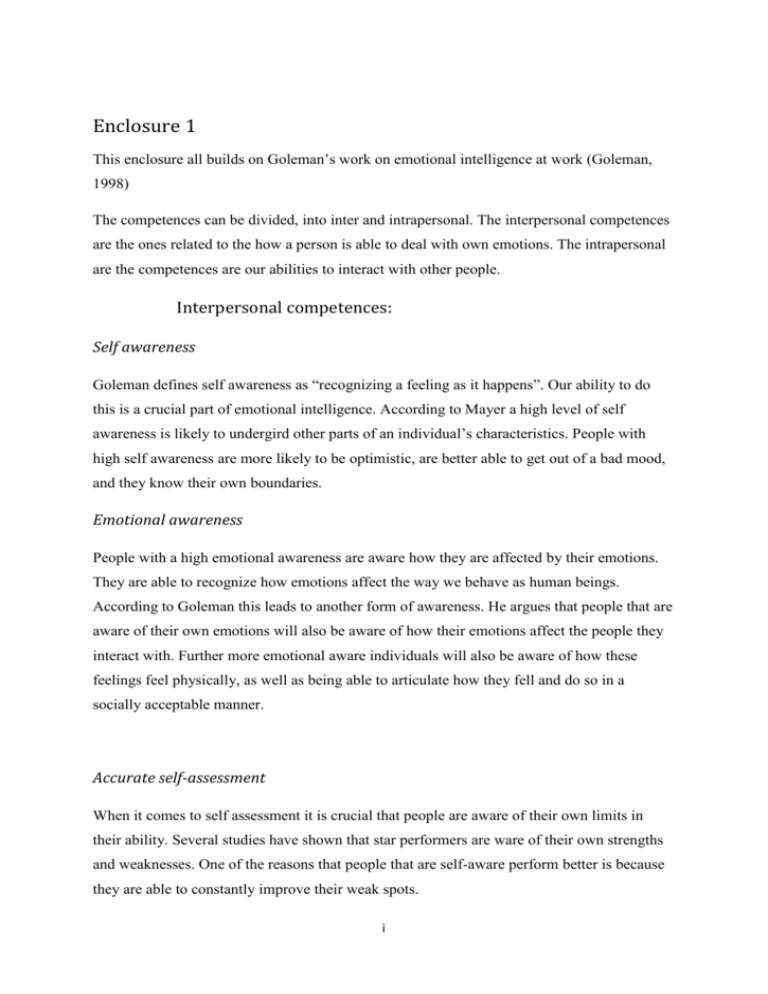
Enclosure 1 This enclosure all builds on Goleman’s work on emotional intelligence at work (Goleman, 1998) The competences can be divided, into inter and intrapersonal. The interpersonal competences are the ones related to the how a person is able to deal with own emotions. The intrapersonal are the competences are our abilities to interact with other people. Interpersonal competences: Self awareness Goleman defines self awareness as “recognizing a feeling as it happens”. Our ability to do this is a crucial part of emotional intelligence. According to Mayer a high level of self awareness is likely to undergird other parts of an individual’s characteristics. People with high self awareness are more likely to be optimistic, are better able to get out of a bad mood, and they know their own boundaries. Emotional awareness People with a high emotional awareness are aware how they are affected by their emotions. They are able to recognize how emotions affect the way we behave as human beings. According to Goleman this leads to another form of awareness. He argues that people that are aware of their own emotions will also be aware of how their emotions affect the people they interact with. Further more emotional aware individuals will also be aware of how these feelings feel physically, as well as being able to articulate how they fell and do so in a socially acceptable manner. Accurate self-assessment When it comes to self assessment it is crucial that people are aware of their own limits in their ability. Several studies have shown that star performers are ware of their own strengths and weaknesses. One of the reasons that people that are self-aware perform better is because they are able to constantly improve their weak spots. i Self control People with a high level of self-control are able to manage their impulses, this enables them to put of pleasure and focus on a task at hand. Self controlled people are also able to manage feelings of distress and anger in positive way. Trustworthiness People with a high degree of emotional intelligence are good at letting people know their intentions, values, feelings and principles. Not only are they able to this, they also act accordingly and this translates into trustworthiness. This is an important quality because trustworthy individuals naturally gain the trust of other which is of great importance when building relationship especially ones of long term. Conscientiousness Conscientious people are usually very organized in the way they carry out their work and are able to keep what they promise. Furthermore they are also good at keeping themselves accountable for meeting their own commitments. Adaptability The adaptable individual is able to deal with ambiguity in a confident manner. This will also allow these individuals to remain calm in the face of change. Innovation ii The innovative individuals are able to find new and original ideas and takes pleasure in doing so. Perhaps more importantly they are able to execute their ideas, which is essential because an idea that can not be executed is worth very little. Achievement drive The need to achieve is one of the single most important indicators of how well we perform. It is what pushes us to achieve and improve our results. They are motivated to finding ways in which they can improve them selves all the time. In order to improve them selves people with a strong drive to achieve constantly try to gain new information and ideas that can help them to improve their performance. Commitment People that are committed do not act selfish. They try to obtain their own goals but are committed to also trying to reach the goals of their organization. This means that they sometimes will have to make short run sacrifices in order to obtain a greater good in the long run. Such commitment is much more likely to occur if the individual person feels they have an emotional attachment to the organization. Initiative Many of us have to be pushed or least encouraged to act, there as people with high level of initiative are able to do so without being forced to act. They are therefore able to act before it is absolutely necessary and thereby grab opportunities that people that do not have the initiative will miss. Optimism Some people sees themselves as being master of their own destiny with a high internal locus of control, where as other feels that external circumstances control their fate and there is little iii they can do change it. The people that have a large internal locus of control tend to be more optimistic than those who do not. They believe that by persistence and hard work they will able to succeed. This makes optimistic people better at dealing with setbacks than pessimistic people. The pessimist sees the setback as having occurred due to some fault in them selves or the environment around them that they are unable to change, whereas the optimist view the setback as having occurred due to factors that they are able to change and therefore persist in trying to reach their goal. Intrapersonal competences: Empathy In the previous part concerning internal competences the importance of self-awareness was explained. Likewise it is important to have an awareness of other people’s feeling when it comes to intrapersonal competences. Goleman states “sensing what other feel without their saying so captures the essence of empathy.” The people with the highest levels of empathy will not only be able to sense what other people are feeling but they also have understanding of the underlying reasons for these feelings. Further more empathetic people actually care about other people and actively act on this empathic feeling by taking care of people what need it. Influence To gain influence you must be capable of handling emotions in others. People whom master this art have the ability to anticipate how people will react to their behavior and can use this to direct people towards their goal. (169) This is strongly related to the understanding of other people as this will allow people to adjust their behavior according to the situation and build rapport with most people. Goleman states “the first step in influence is gaining rapport”. High EI individuals therefore spend time to build a bond which others may have neglected. These individuals are able to gain influences through indirect strategies and therefore doing almost unnoticed by others. If it is discovered that strategies are employed it may very well be perceived as manipulative behavior and may backfire. iv Communication Good communicators use many concrete skills related to emotional intelligence when they communicate. They are open towards messages from other people letting everybody be heard. This is strongly connected to having good listening skills. Another vital competence required to be a good communicator is being in control of emotions. People that are able to stay calm and composed in heated situations will not let their emotions control them but be in control of how they communicate even under extreme pressure. Conflict management People that are skilled at conflict management have the ability to identify a potentially troubling situation and are able to calm down the people involved. In doing so they are able to create a situation where an open discussion takes place calmly. This creates the possibility for resolving the conflict in a positive manner with the possibility of creating a win-win situation. Building bonds Psychological proximity is more important than physical proximity then it comes to bonding with people. It is therefore crucial to build rapport with people in order to build a network. v
